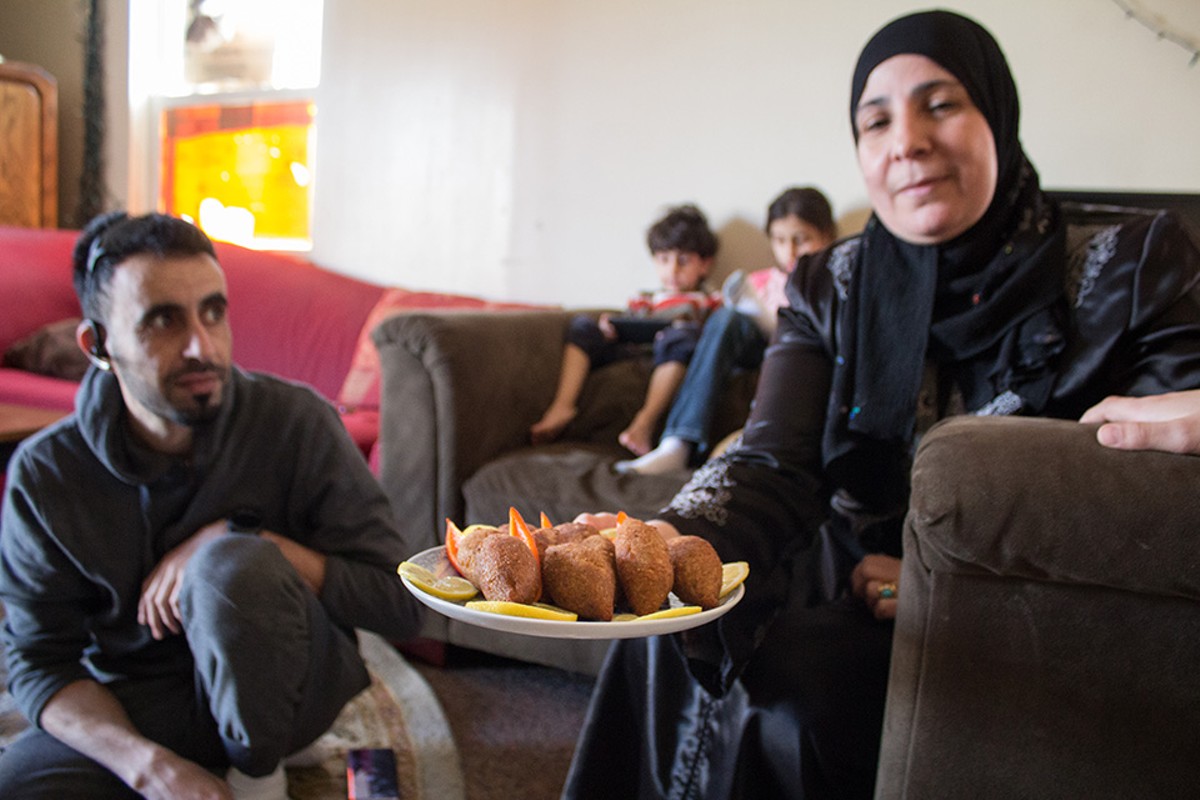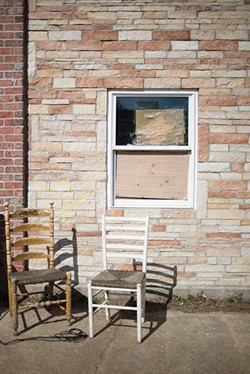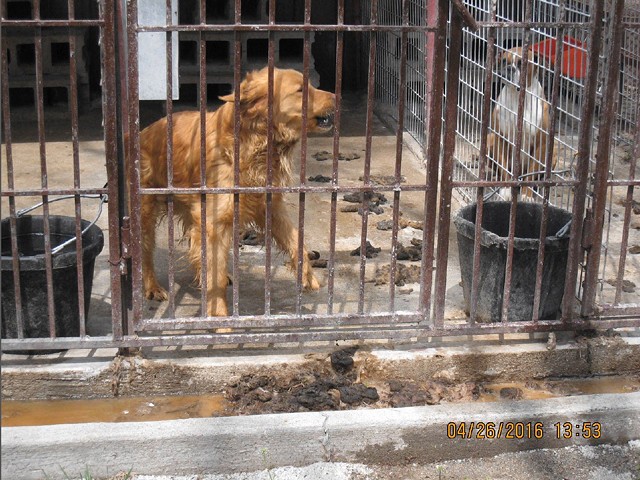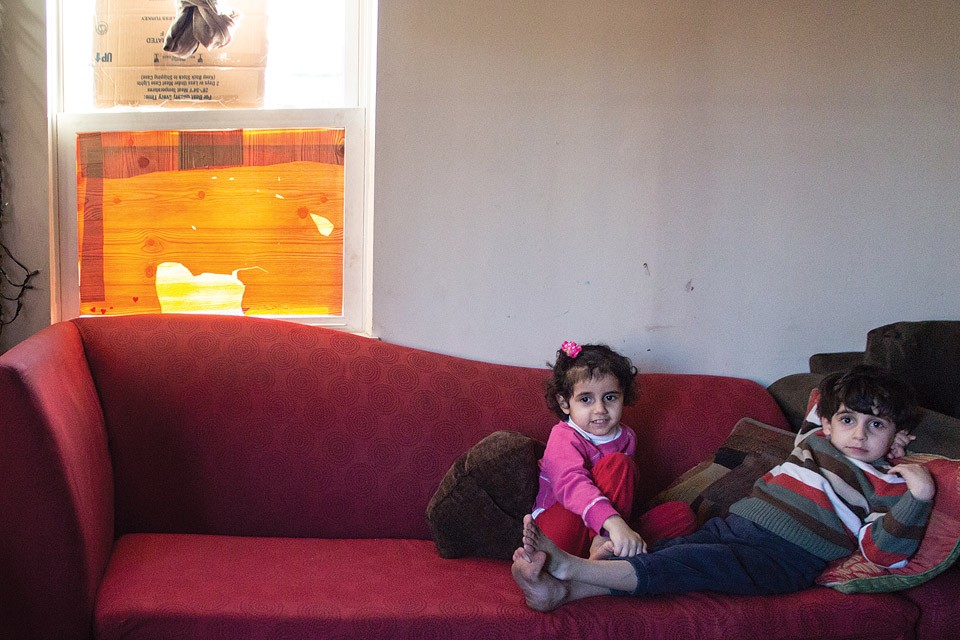
Back at the Welcome dinner, the guests are savoring their baklava.Bueler, standing at the head of the room, calls attention and gives thanks to everyone involved, to applause. She announces the next Supper Club event. Then she indicates the woman standing next to her, Iman Alkrad.
"Iman would like to share a story with you all. Iman, do you want to talk about your first day in St. Louis?"
Alkrad speaks haltingly, to accommodate a translator. "It was a bad day," she says. "I was crying. (Translation.) I traveled a long distance. (Translation.) It's been seven years since I've seen my daughters. (Translation.) I felt scared. (Translation.) And after I met people here and Jessica came to visit me at home with the group, with Susan, they became like my family, like sisters. (Translation.) They helped us, thank Allah."
In the pauses during translations, Alkrad returns to Daraa, on the southern tip of Syria. She fled in February 2013 with blankets and kitchen tools, her home demolished, leaving one daughter behind. It was two years after the outbreak of Syrian unrest, 700 days of bloodshed. One day, during Eid al-Adha ("Feast of Sacrifice"), an explosion shook the city. A car bomb had gone off outside a restaurant where children were playing. Blood and flesh flew everywhere. Children and women screamed. Iman's kids had only just left the area to come home.
Another time, Alkrad's 21-year-old nephew's house was shelled. His one-month-old daughter survived with a broken leg. They found the mother in pieces in the bathroom. The father's head exploded on the living room carpet.
Alkrad fled with her family to the Jordanian desert, where they lived for two months in a tent camp. The tents were candle-lit and would sometimes catch fire, burning up their inhabitants. Because there was no security in the camp, rape was common; someone always kept watch through the night.
It was there they learned that Iman's mother-in-law, trapped in a basement in Syria, had suffocated from the fumes of a gas bomb. Eventually Alkrad's family smuggled themselves out on a bus and got onto a list for UN refugee resettlement, from which Alkrad and her husband were sent to St. Louis.
"I wish I could hold my daughter," Alkrad says. "I don't know if I'll see her again. I don't know if I'll see my brothers. Only Allah knows. Inshallah [God willing]."
Alifa Alahmad, who is standing next to Alkrad at the dinner and preparing to speak, suddenly finds herself back in Aleppo, site of the brutal four-year Battle of Aleppo between the Syrian military and opposition forces. No one left their shelled homes; snipers hiding in the ruins fixed on anything that moved. A pregnant woman in labor finally ventured outside, holding a white rag as a sign of peace, desperately looking for a place to give birth. They shot her.
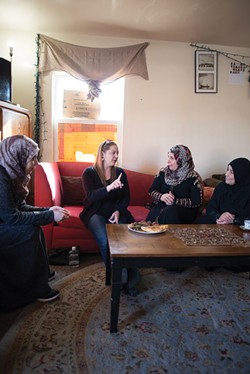
Alderman Boyd, in a separate 2016 interview with KMOV, argues that violence terrorizes his whole ward, not just the Syrians living in it. It's a fair point. Many have lived their entire lives amid violence. The question becomes a nebulous one, one of quantifying St. Louis' complicated violence: Do the Syrians, who did not grow up in this community, deserve to leapfrog black residents, who have suffered centuries of racial and economic discrimination, into a safe neighborhood?
And yet in Syria, at least these families were thrust into a chaos for which they had context. Here in north St. Louis they are not only scared but culturally lost. For those born here, the world expands at the rate at which we speak to others, unfolding their worlds into our own. For a refugee who doesn't know the language, the world is fixed to the size of how many other Syrian refugees are around them. At Hodiamont, the world has shrunk to three families big.
It's not the poverty or the bed bugs' bite that overwhelms. It's the unfilled promise of peace, the anxiety of red memories that never leave, and the new alien fear that every brushed hair, itch, tic or any other minute sensation is a bed bug or roach that eventually overwhelms.
Najlaa Alsaadi, another of the Supper Club cooks, speaking of Syria, later tells me: "It never escapes us, never escapes our mind. I was just on the phone with my mother yesterday. She said she wishes she can hold me, and I started crying, and she started crying. Even after we hung up, she called me again five minutes later, just to tell me to stop crying."
The Supper Club event is winding down. Those Americans who came with friends are leaving; those who managed to introduce themselves to Syrians are still chatting excitedly with them. At the end of one table, next to the plundered remnants of food trays, Maysaa Telmesani speaks into a cell phone, waiting for Google Translate to perform its charms. She then passes it to the woman across her, who looks at the English and laughs.
"This is the thing that's empowering them to take the next step, to talk to people, to give them the confidence to use English, and to actually make money," Bueler says. Supper Clubs serve all of these ends.
Telmesani, a Syrian teacher, arrived in the U.S. four hours before Trump's Muslim ban took effect. A week later, Telmesani receives the chance to teach again for one hour at Mallinckrodt Academy, a south-city school for the gifted. In front of a crowd of bored, relatively affluent young children, Telmesani shows the children a slideshow photo of her once- upon-a-time Syrian students. Then she wrings from her nascent English vocabulary the story of Daraa, where the Syrian revolution began on March 6, 2011.
"Some students — I think that they were at the same age as you — in Daraa," she says, "wrote some words in the street. The statement... The meaning of the statement in English was, 'Dr. Bashar, your return is coming.'
"An officer in Daraa — he was the cousin of the president — he took these students who wrote these statements and took them to a place. We can say it was a prison. They force fear on them and killed them and take their [finger]nails from their places. He took their nails."
Schoolchildren seldom give public speakers serious attention, especially if the speaker is an adult with a thick accent. Yet several of the students here gasp, locked onto Telmesani. One young girl gapes for the rest of the hour, horrified. Telmesani goes on to describe how Syrian officials broke her father's skull. One of the teachers raises her eyebrows and glances at the students, concerned yet ultimately unwilling to stop this grown woman tearing up in front of children she's met this week.
There's a fantasy that refugees, once they arrive, start life anew. But of course they don't. They continue living, and every time gunshots ring out in north city, a family member, a friend or a pregnant woman holding a white flag dies again, and the past keeps knocking on the door of the future.
Since the Supper Club event at the Boo Cat Club, Alifa Alahmad and her family have relocated from the Garden Apartments to a home in Crestwood. Three families remain, including Iman and Ammar Alkrad's, waiting for the war to end.
Quotations from Arabic were translated by photographer Sara Bannoura.

